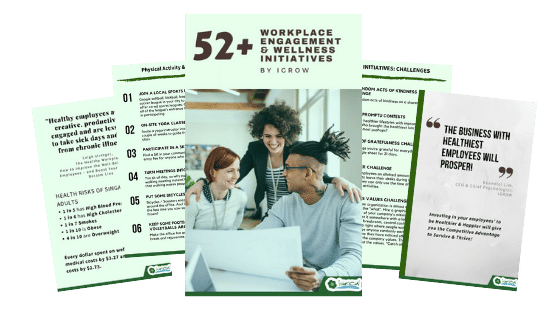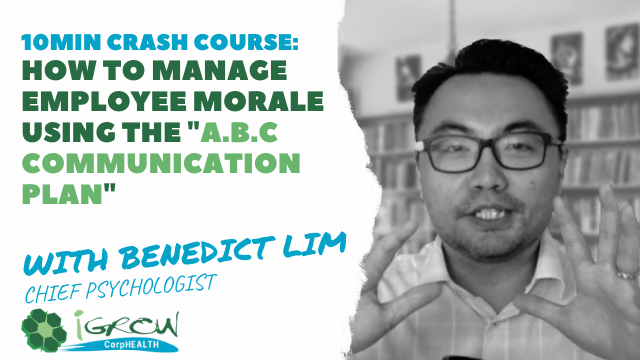ANCHORING ON SAFE BELIEFS
How to Manage Negative Thoughts
Anchoring on Safe Beliefs

Anxiety is a normal and natural reaction to our worries. It alerts us to potential dangers to ourselves or to the people and things that we hold dear. Even our ancestors relied upon anxiety to ensure their continued survival since they used it to keep them alert and eventually invoke a fight-or-flight response when dealing with the unknown. And so at its very core, anxiety is something that is useful and necessary and normal for us to feel.
However, extended feelings of high amounts of anxiety is no longer healthy. The constant alertness and tenseness wears us down both physically and mentally, and we will eventually get to the point where we are paralyzed, crippled, unmotivated, and unwilling to do anything.
It is important that we know how to properly manage and deal with anxiety, especially in this unfamiliar and uncertain time.
The Power of Belief

We all have 2 voices that we use in our day to day lives. The 1st voice is our physical voice which comes out of our mouth and is utilized for communication with the people around us. The 2nd voice that we have is the one that is in our minds that we use to do our self-talk.
This 2nd voice that is in us is very powerful. So powerful, in fact, that it has the ability to change how we think and ultimately, how we act. For a mentally healthy person, the voice inside is a mix of positive self-talk - the one that praises efforts, identifies strengths, and helps with looking for solutions - as well as negative self-talk - pushes us to do even more, sees the weaknesses, and looks out for problems.
For a less mentally healthy person, however, the 2nd voice is full of negative self-talk only. That is not to say that pure positive self-talk is good - you can’t improve if you think you’re perfect, after all. But for the majority of anxious people, they are filled with negative thoughts. Thoughts of hopelessness, powerlessness, and worthlessness fill their minds, causing them to be stressed and depressed and unmotivated.
We are filled with enough dread and uncertainty as it is, and as humans, we have a negative bias - that is, we tend to focus more on the bad than on the good - and this combination of dreadful thoughts and the negative bias will certainly amplify our negative emotions.
And so on the path to managing our anxiety, the first step is to identify that there is a problem and what the problem is, and the 2nd just as important step is A: Anchor on Safe Beliefs.
Changing the way we think or simply how we look at things will do wonders for managing our anxiety.
The 3B's: Belief, Behavior, Become
The 3B’s is a model of anxiety management that aims to change what we are by changing our thoughts and actions.

Essentially, this means that we have to change our Belief (way of thinking) and Behavior (way of acting) to Become (what we are).
The 3B’s work in 2 ways. We can believe in negative things, behave in negative ways, and eventually become a negative person. Or - and this is what we want - we can choose to believe in neutral to positive things, behave in a neutral or positive, and ultimately become a neutral to positive person.
It is important to note that we do not necessarily want to shift to a very positive mindset. That is tiring for most people, and definitely even more tiring for a person who is normally anxious. And so what we want initially is to shift from a dangerous place (negative) to a safe place (neutral). Once we are now in a safe place, we can work on shifting from the safe place (neutral) to a successful place (positive).
The 3B's: Belief, Behavior, Become
As the French philosopher René Descartes said, “I think, therefore I am.”
We must remember that our inner voice plays a big role in how we behave because our inner voice is the one that is responsible for self-talk. If we relentlessly beat ourselves up in negative self-talk, then it is only natural that our negative emotions are amplified and it will lead only to more negative self-talk.
We must be able to catch ourselves doing unhealthy negative self-talk, and shift our mindset from a dangerous place to a safe place and eventually, towards a successful place. Words have power, and even more so for the words we always tell ourselves.

Share this post on:
CURATED CONTENT TO BUILD PSYCHOLOGICAL CAPITAL
CURATED RESOURCES
Essential Tips for Working from Home
7 Key Things you must do when working from home to stay productive! Click here for more information.
52+ WORKPLACE ENGAGEMENT & WELLNESS INITIATIVESTM
This idea library of 52+ tried and tested employee engagement initiatives that we use with our clients will give you great ideas without any stress of looking for things that works. Click here for more information.
HOW TO MANAGE EMPLOYEE MORALE AMIDST UNCERTAINTIES
10min Crash Course on using A.B.C. Communication Plan to manage your employee's morale amidst uncertainties.
CONTACT US

Address: 60 Paya Lebar Road, #09-25 Singapore 409051 Phone: +65 6871 8777
Copyright © 2018 iGROW
DISCLAIMER: This site is not a part of the Facebook website or Facebook INC. Additionally, this site is NOT endorsed by Facebook in ANY WAY. Facebook is a trademark of Facebook INC.




